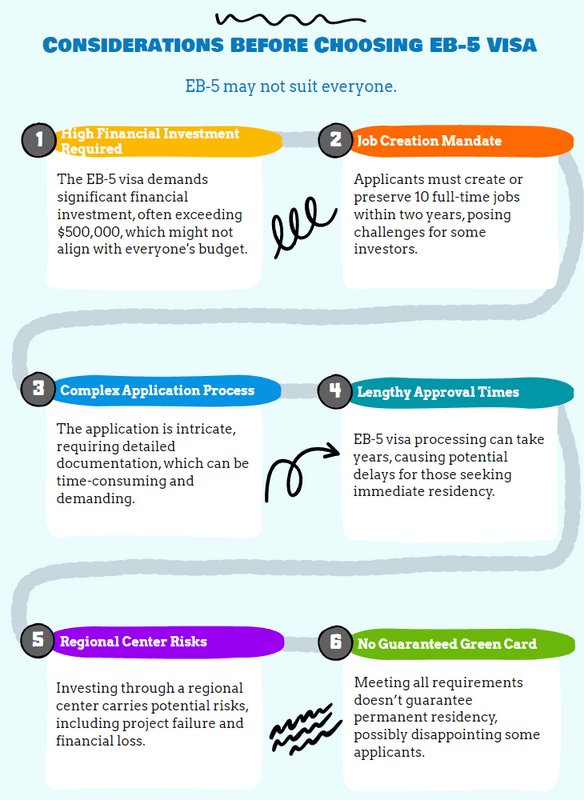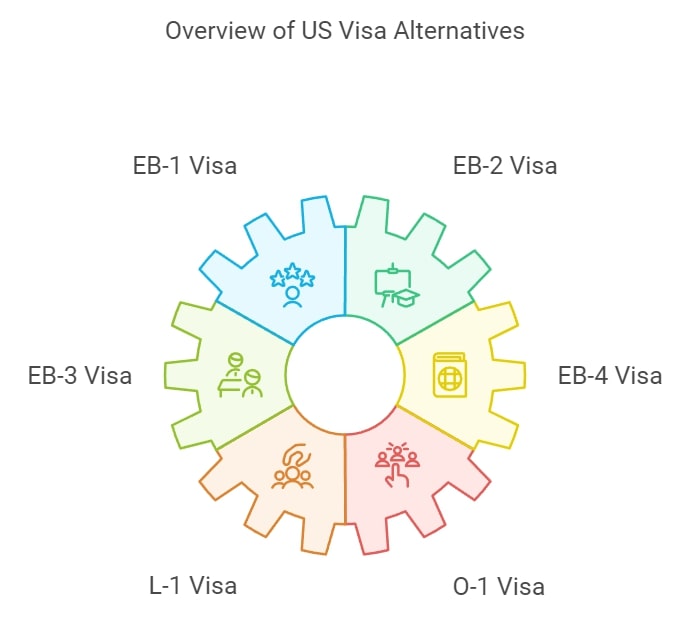EB-5 Visa Alternatives
Boost Your Freedom Without Compromise.
- Who offers the CHEAPEST program available.
- Who offers the BEST program available.
- What you need to qualify?

- The EB-5 visa may not be ideal for everyone due to cost, processing time, or job creation requirements.
- U.S. immigration offers several alternative visa categories suited for different skills and professional backgrounds.
- Visas like EB-1 and O-1 target individuals with extraordinary abilities or international acclaim.
- The L-1 visa is designed for intra-company transferees, offering a potential pathway to a green card.
- Each visa type has specific criteria, timelines, and benefits—strategic selection is key to success.
EB-5 visa alternatives are fast becoming a hot topic for immigrants eyeing the US.
Navigating the complex avenues of US immigration can be daunting, but with our comprehensive guide on the 6 top alternatives to the EB-5 visa, we aim to be your trusted partner in this pivotal journey.
In This Article, You Will Discover:
With the expert research we’ve done for you, you can uncover everything you need to know about each visa type so that you can determine the best fit for you.
Read on…
- Who offers the CHEAPEST program available.
- Who offers the BEST program available.
- What you need to qualify?
 Free Consultation
Free Consultation Easy to Use
Easy to Use 100% Safe & Secure
100% Safe & Secure
While the EB-5 visa is a well-known route to U.S. permanent residency through investment, it isn’t the best fit for every investor. High financial thresholds, lengthy processing times, and strict eligibility requirements can make the EB-5 program challenging. Fortunately, the U.S. offers several alternative immigration pathways for entrepreneurs, skilled professionals, executives, and individuals with exceptional abilities. This guide explores the top alternatives to the EB-5 visa, helping you make an informed decision for your U.S. immigration journey.
For a broader perspective on global investment migration, explore the WorldPassports citizenship by investment overview.
Why the EB-5 Visa May Not Suit Every Investor
The EB-5 visa requires a significant investment—typically $800,000 to $1.05 million—into a qualifying U.S. business. While it offers a direct path to a green card, the program comes with notable risks and challenges:
- Substantial Financial Commitment: The required investment is high, and there’s no guarantee of business success or return of capital.
- Processing Delays: Backlogs and country-specific quotas can result in multi-year waiting periods.
- Regulatory Uncertainty: Legislative changes and increased scrutiny can impact program stability and eligibility.
Given these factors, many investors explore alternative U.S. visa options that may better align with their goals and resources.

Top U.S. Immigration Alternatives to the EB-5 Visa
The U.S. immigration system offers a range of employment-based and investment-based visas. Each has unique eligibility criteria, benefits, and application processes. Below, we break down the most prominent alternatives.

EB-1 Visa: Extraordinary Ability and Multinational Managers
The EB-1 visa is designed for individuals who have reached the top of their field or are multinational executives and managers.
Key Points:
- Extraordinary Ability (EB-1A): For those with sustained national or international acclaim in sciences, arts, education, business, or athletics. No job offer required.
- Outstanding Professors/Researchers (EB-1B): Requires international recognition and a job offer from a U.S. institution.
- Multinational Managers/Executives (EB-1C): For those who have worked in a managerial or executive role for a multinational company abroad for at least one year in the past three years and are transferring to a U.S. branch.
Benefits:
EB-2 Visa: Advanced Degree and Exceptional Ability
The EB-2 visa targets professionals with advanced degrees or exceptional ability in their field.
Key Points:
- Advanced Degree: Requires a master’s degree or higher (or a bachelor’s plus five years of progressive experience).
- Exceptional Ability: For those with expertise significantly above the norm in sciences, arts, or business.
- National Interest Waiver (NIW): Allows self-petitioning if the applicant’s work benefits the U.S. national interest.
Benefits:
- Direct path to a green card.
- Option to self-petition under NIW for those whose work is of national importance.
EB-3 Visa: Skilled, Professional, and Unskilled Workers
The EB-3 visa is suitable for a broader range of workers, including skilled, professional, and unskilled labor.
Key Points:
- Skilled Workers: At least two years of experience or training.
- Professionals: U.S. bachelor’s degree or foreign equivalent.
- Other Workers: Unskilled labor requiring less than two years of training.
Benefits:
- Pathway to permanent residency for a wide range of occupations.
- Family members can also obtain green cards.
EB-4 Visa: Special Immigrant Categories
The EB-4 visa is for special categories, including religious workers, certain broadcasters, military members, and employees of international organizations.
Key Points:
- Caters to niche groups not covered by other employment-based visas.
- Direct path to permanent residency for qualifying applicants.
Benefits:
- Unique eligibility for specific professions and circumstances.
L-1 Visa: Intra-Company Transferees
The L-1 visa allows multinational companies to transfer managers, executives, or employees with specialized knowledge to a U.S. office.
Key Points:
- L-1A: For managers and executives (up to 7 years).
- L-1B: For employees with specialized knowledge (up to 5 years).
- Requires at least one year of employment with the foreign company in the past three years.
Benefits:
O-1 Visa: Individuals with Extraordinary Ability
The O-1 visa is for individuals with extraordinary ability in sciences, arts, education, business, or athletics.
Key Points:
- Requires evidence of national or international acclaim.
- Must have a U.S. employer or agent as a sponsor.
- No annual cap and unlimited extensions.
Benefits:
- Flexible for top talent in various fields.
- Can be a stepping stone to permanent residency via the EB-1A category.
E-2 Treaty Investor Visa
The E-2 visa is a non-immigrant option for nationals of treaty countries who invest a “substantial” amount in a U.S. business.
Key Points:
- No set minimum investment, but $100,000+ is typical.
- Only available to citizens of countries with a U.S. treaty.
- Does not directly lead to a green card, but can be renewed indefinitely.
Benefits:
- Lower investment threshold than EB-5.
- Fast processing and family benefits.
- Flexible for entrepreneurs seeking to start or buy a U.S. business.
For a detailed comparison of the pros and cons of these programs, see the citizenship by investment pros and cons guide.
Common Questions
Is It Hard to Get an EB-5 Visa?
Which Alternative to the EB-5 Visa Is the Most Popular?
Which Countries Are Worth Investing In?
What’s a Golden Visa?
Is the EB-5 Visa the Best Immigrant Visa?
Which Country Has the Cheapest Investment Visa?
Which US Visa Is the Easiest to Obtain?
In Conclusion
Choosing the right U.S. immigration pathway depends on your background, investment capacity, and long-term goals. While the EB-5 visa remains a strong option for those seeking direct permanent residency through investment, alternatives like the EB-1, EB-2, EB-3, EB-4, L-1, O-1, and E-2 visas offer diverse routes tailored to different profiles. Strategic selection and expert guidance are key to a successful U.S. immigration journey.
For more information on affordable global investment migration options, visit the cheapest citizenship by investment programs.
Disclaimer: This article is for informational purposes only. Immigration laws and requirements are subject to change. Always consult a qualified immigration professional before making investment or residency decisions.
- Who offers the CHEAPEST program available.
- Who offers the BEST program available.
- What you need to qualify?
 Free Consultation
Free Consultation Easy to Use
Easy to Use 100% Safe & Secure
100% Safe & Secure





